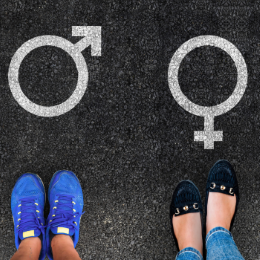Exploring the controversy surrounding the teaching of gender identity in UK schools: balancing legal obligations, political ideologies, and personal beliefs

Blog post by Maria Salas Dual
In 2020, the Department for Education (DfE) in the United Kingdom published new guidance on relationships and sex education (RSE), which stated that pupils should be taught about gender identity in an age-appropriate and inclusive way. This guidance has been met with some resistance, with some arguing that teaching children about gender identity is inconsistent with the Education Act 1996, s.406,(1) which prohibits "political indoctrination."
The controversy surrounding the teaching of gender identity in UK schools highlights the complex and multifaceted nature of the intersection of law, politics, and education. On the one hand, there is a legal obligation to provide comprehensive and inclusive education to all pupils, including teaching about issues such as gender identity. This is based on the principle that all children have the right to an education that is free from discrimination and that prepares them to be active and informed citizens.
Supporters of the teaching of gender identity in schools argue that it is important to provide pupils with accurate and up-to-date information about sex, sexuality, sexual health, and gender identity and that this is particularly important in the context of the current social and cultural environment. They argue that failing to teach children about gender identity can lead to ignorance and misunderstanding, which can in turn contribute to discrimination and prejudice.
Additionally, supporters of the teaching of gender identity in schools argue that it is important to create a safe and inclusive learning environment for all pupils, regardless of their sexual orientation or gender identity. This includes ensuring that pupils have access to support and resources if they are struggling with issues related to their sexual orientation or gender identity and that they are treated with respect and dignity by their peers and teachers.
Some opponents of the teaching of gender identity in schools argue that it is not appropriate to teach children about issues that are inconsistent with the values or beliefs of their families or communities and that this infringes upon their right to freedom of religion. They argue that it is not the place of the state or public schools to teach children about matters that are at odds with the religious beliefs of their families or communities.
The right to freedom of religion is a fundamental human right (Art.18), (2) and also a protected characteristic under the Equality Act 2010 (3). This means that individuals have the right to hold and express their own religious beliefs and to teach their children about these beliefs. While freedom of religion is a fundamental human right, it is also important to recognize that human rights are universal and that all individuals are entitled to the same basic rights and protections, regardless of their religion or beliefs. This includes the right to education, the right to be free from discrimination, and the right to live a life of dignity and respect. It is crucial to ensure that all individuals could exercise their human rights and that their rights are protected by the law. The exercise of one's freedom of religion may conflict with the rights of others or with the laws of the state. In these cases, it is necessary to find a way to balance and reconcile these competing interests.
The RSE guidance issued by the Department for Education (DfE) applies to all schools in the UK, regardless of their type or funding. The guidance recognises that faith schools may have religious beliefs and values that are at odds with certain aspects of RSE, such as the acceptance of LGBTQ+ identities or the promotion of certain types of sexual behavior. The guidance allows for faith schools to teach about these topics in a way that aligns with their faith, even if these beliefs view same-sex relationships as sinful or immoral. At the same time, pupils must receive accurate and up-to-date information about sex, sexuality, sexual health, and gender identity.
The case R v Welsh Ministers (2022), (4) brought by parents argued that the removal of the right to withdraw children from comprehensive sexual education classes (RSE) violated their common law rights and human rights as parents. This has been rejected by the High Court, which ruled that the lessons are lawful. Mrs. Justice Steyn said the content of the RSE Code and Guidance is consistent with the requirement to present the material in an objective, critical and pluralistic manner, and does not violate the prohibition on indoctrination. The Code and Guidance do not authorise or approve teaching that promotes one sexual identity or lifestyle over others, or that encourages children to self-identify in a particular way. This decision is consistent with previous decisions in similar challenges to RSE in European case law.
It is true that children in the United Kingdom may have different educational experiences depending on which school they attend, and this can potentially lead to differences in values and perspectives as they grow into adulthood. While it is natural for there to be some diversity of values and beliefs within a society, it is vital to strive for a shared set of values that promote the common good and the well-being of all members of society.
Managing the overlap of law, politics, and education can be challenging, especially when it comes to the controversial topic of relationships and sex education (RSE) in the UK. One way to address these issues effectively is by fostering open and respectful communication between individuals with diverse values and beliefs, striving towards a sense of unity and community. This includes working towards fair treatment for all and trying to understand different perspectives. Ultimately, the aim should be to build a society that is inclusive, just, and conducive to the well-being and growth of every member.
References
- Education Act 1996, s. 406
- https://www.ohchr.org/en/topic/freedom-religion
- Equality Act 2010, s. 10
- R (on the application of Isherwood) v Welsh Ministers [2022] 12 WLUK 437
- https://assets.publishing.service.gov.uk/government/uploads/system/uplo…
- https://www.gov.uk/government/publications/free-schools-application-inf…

Maria Salas Dual
My name is Maria and I live in London. I am currently studying for a Bachelor of Laws (Hons) degree at the Open University. Before starting my degree, I completed a course in legal secretary studies and have been working in the field for the past ten years.
Throughout my professional career, I have gained experience in various legal matters, particularly in family law and child law. These areas are of particular interest to me and I am eager to delve deeper into them through my studies.
I have also been actively involved in volunteering for a child rights organization, as I am passionate about advocating for the rights of children and ensuring that they have the opportunity to grow up in a safe and supportive environment.
In the future, I hope to use my legal knowledge and skills to make a positive impact on those who are in need. I am excited to see where my journey in law takes me and am determined to make the most of every opportunity that comes my way.